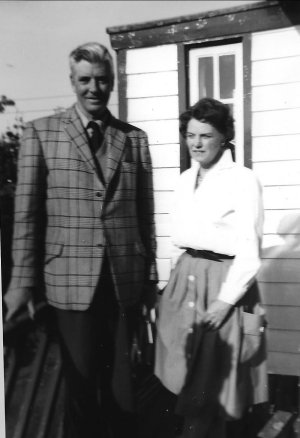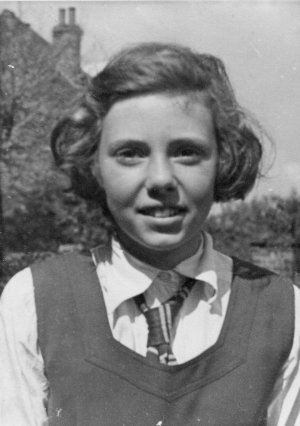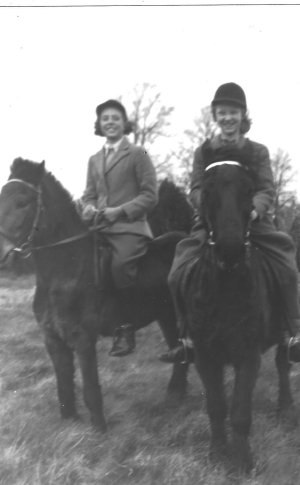Childhood
In the next few chapters I want to give more information about my lovely wife and partner in life’s mission: Jackie – Jacqueline Anne Cecilia Clackson. Jackie was the daughter of Norman Clackson, sales manager of the Yachting Monthly, and Tess O’Neil. She was born on the 27th of March 1937 in Muswell Hill, London. Within the same year the family moved to their new home ‘Coppins’ in Woodside Green near Great Hallingbury, Essex.
Jackie’s earliest years were coloured by the second world war. Since she has written about this in a booklet called ‘Recollections’ (Denham 2019, pp. 57-58), we can hear the story in her own words:
“When WWII began I was 2 years old…and then the tough time started! My father was recruited into the Royal Navy, Lieutenant-Commander Norman Clackson, and went onto a ship which was one of a convoy in the Mediterranean, as part of the programme to cope with the Italian army fighting in the North of Italy. My mother, Tess, let our home in Essex at the time and we spent the next few years in various homes of family and friends. It is a time I do remember well as living with other groups of people with boys and girls of other ages can be quite demanding! Also, with tough food rationing at the time and not much choice in what we could buy, we always felt hungry!

Jackie’s parents, Norman and Tess
While staying with some cousins at one stage my mother listened on the radio every day about the names of the boats that had been attacked and sunk as we did not get any news from my father just then. One day in March 1941 she heard the name of his ship HMS Rosaura – it had hit a mine in the sea near Tobruk in Libya and had sunk within six minutes…!!
My mother was devastated… Luckily my grandfather was with us at the time and immediately rang the Admiralty to find a list of names of any survivors. Happily, my father’s name was there… He had been one of the few on duty on the bridge at the time! He was rescued from the sea by a ship at the end of the convoy sometime later, as only one ship at the end of the convoy was allowed to rescue people to minimise trouble. The ship took the few they had rescued to Egypt where my father stayed for a couple of years. He worked for naval intelligence in Alexandria supporting what was going on in the battles at that time. I still have a collection of the letters my father sent to my mother while in Egypt… a very touching correspondence… but, of course, nothing about the kind of work he was doing at that time!
I was about four by then and an interesting photo came over of my father on a camel in front of a pyramid. I was delighted with the picture, and my mother told me later that I had said ‘I want that camel!’ In 1943 the moving around to different families had become very stressful, so we moved back into our own home. A school friend of my mother with her young son came to stay with us and we all got on very well. I still remember hearing the sound of the bomber planes going over us at various times, and the sound of the V2 ‘doodle-bug’ planes from Germany which were really robots and could land and bomb anywhere!!
One day in 1943 my mother received an amazing telephone call from the port of Hull in the North of England. It was from my father who had just come back from Egypt and would be with us in a few hours by train! He arrived home during the night and he and my mother were both relieved and delighted to be together again after four years apart! In the morning my mother came into my bedroom and said to me: “We have a big surprise!… guess what it is!?”
I remember feeling great excitement and shouted out: “It’s a banana, a banana!”
My mother knew what I meant. Bananas were a delicacy we could hardly get at that time. She sat down on the bed, held my hands and told me: “More than a banana! Your Daddy is home with us again!” I was six years old and had only been two when he left to work at sea, so we did take a bit of time to get used to each other again.
Although Daddy began working each day up in London, we did not know that he was in the basement of the Admiralty at famous Room 13, part of a team of twelve highly professional men and women. This was where his top secret intelligence unit was based. It specialised in creating ingenious plots for deceiving the enemy. One important plan was called ‘Operation Mincemeat’ which was to fool Germany into thinking that the allied army would attack Sardinia and Corsica on their way into Europe instead of Sicily which was their real plan. The unit worked out a scheme to drop the dead body of an ‘officer’ near Spain, as if he had been the victim of an aircraft crash at sea. The body carried letters ostensibly meant for the British Vice-Consul in North Africa, letters which revealed the phony Allied invasion plans.
The operation succeeded as intended. Intelligence sussed out what the Spanish and Germans did with the information they recovered. Gradually the news came through that the deception was being believed. The German army was diverted to Sardinia and Corsica. This left room in Sicily for British and American troops to invade the land and move into Europe which helped bring about the end of the German occupation of Italy and France!!
We only knew about how my father had been involved over ten years later when the first book about that deception had been written by Ewen Montagu, who had been head of the intelligence unit and also a great friend of my father. The book published in 1953 was called ‘The Man Who Never Was’ and was so popular it sold out completely within days!”
Going to school

Jackie ten years old
For her primary and secondary education Jackie attended Chantry Mount Girls’ High School in Bishops Stortford. It soon became apparent that her strengths lay on the cultural and artistic side of life. She scored high marks for English Literature, Drawing and Art, and Music. She received special piano classes and also played the guitar. In this aspect she took very much after her mother Tess who won first prizes at local flower shows for her artistic flower arrangements and who was given major parts in her acting for the Bishops Stortford Theatre Club.
In sports Jackie did well at school. She excelled in swimming and tennis, and was a member of the school’s first lacross team which used to compete successfully with other schools.
Jackie’s father made sure Jackie’s education was geared to making her an independent person. Each day Jackie had to cycle the 12-mile distance to school and back. This could be quite tough especially in winter with the hilly rural roads being slippery and badly lit.

Jackie on ‘Puffin’, with friend
Jackie was given a pony which she called ‘Puffin’. The condition was that she had to care for it herself. That meant feeding, cleaning, grooming, taking it to the local smithy to have it’s shoes refitted whenever necessary. Jackie would often get up very early in the morning, saddle up Puffin and take her for a ride in nearby Hatfield Forest. All this before she had her breakfast and went off to school.
Jackie also began to record events of the day and her reflections on them in her diary. “From that time on”, she once confided to me, “I started to think on my own.”
Next Youth and Studies
THE STORY OF MY LIFE
- » FOREWORD
- » Part One. LEARNING TO SURVIVE
- » origins
- » into gaping jaws
- » from the pincers of death
- » my father
- » my mother
- » my rules for survival
- » Part Two. SUBMIT TO CLERICAL DOGMA — OR THINK FOR MYSELF?
- » seeking love
- » learning to think
- » what kind of priest?
- » training for battle
- » clash of minds
- » lessons on the way to India
- » Part Three (1). INDIA - building 'church'
- » St John's Seminary Hyderabad
- » Andhra Pradesh
- » Jyotirmai – spreading light
- » Indian Liturgy
- » Sisters' Formation in Jeevan Jyothi
- » Helping the poor
- » Part Three (2). INDIA – creating media
- » Amruthavani
- » Background to the Gospels
- » Storytelling
- » Bible translation
- » Film on Christ: Karunamayudu
- » The illustrated life of Christ
- » Part Three (3). INDIA - redeeming 'body'
- » spotting the octopus
- » the challenge
- » screwed up sex guru
- » finding God in a partner?
- » my code for sex and love
- » Part Four. MILL HILL SOCIETY
- » My job at Mill Hill
- » The future of missionary societies
- » Recruitment and Formation
- » Returned Missionaries
- » Brothers and Associates
- » Part Five. HOUSETOP LONDON
- » Planning my work
- » Teaching teaching
- » Pakistan
- » Biblical Spirituality
- » Searching God in our modern world
- » ARK2 Christian Television
- » Part Five (2) New Religious Movements
- » Sects & Cults
- » Wisdom from the East?
- » Masters of Deception
- » Part Five (3). VIDEO COURSES
- » Faith formation through video
- » Our Spirituality Courses
- » Walking on Water
- » My Galilee My People
- » Together in My Name
- » I Have No Favourites
- » How to Make Sense of God
- » Part Six (1). RESIGNATION
- » Publicity
- » Preamble
- » Reaction in India
- » Mill Hill responses
- » The Vatican
- » Part 6 (2). JACKIE
- » childhood
- » youth and studies
- » finding God
- » Mission in India
- » Housetop apostolate
- » poetry
- » our marriage
